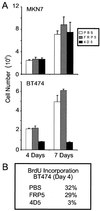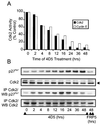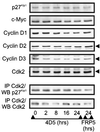ErbB2 potentiates breast tumor proliferation through modulation of p27(Kip1)-Cdk2 complex formation: receptor overexpression does not determine growth dependency
- PMID: 10757805
- PMCID: PMC85615
- DOI: 10.1128/MCB.20.9.3210-3223.2000
ErbB2 potentiates breast tumor proliferation through modulation of p27(Kip1)-Cdk2 complex formation: receptor overexpression does not determine growth dependency
Abstract
Overexpression of the ErbB2 receptor, a major component of the ErbB receptor signaling network, contributes to the development of a number of human cancers. ErbB2 presents itself, therefore, as a target for antibody-mediated therapies. In this respect, anti-ErbB2 monoclonal antibody 4D5 specifically inhibits the growth of tumor cells overexpressing ErbB2. We have analyzed the effect of 4D5-mediated ErbB2 inhibition on the cell cycle of the breast tumor cell line BT474. 4D5 treatment of BT474 cells resulted in a G(1) arrest, preceded by rapid dephosphorylation of ErbB2, inhibition of cytoplasmic signal transduction pathways, accumulation of the cyclin-dependent kinase inhibitor p27(Kip1), and inactivation of cyclin-Cdk2 complexes. Time courses demonstrated that 4D5 treatment redirects p27(Kip1) onto Cdk2 complexes, an event preceding increased p27(Kip1) expression; this correlates with the downregulation of c-Myc and D-type cyclins (proteins involved in p27(Kip1) sequestration) and the loss of p27(Kip1) from Cdk4 complexes. Similar events were observed in ErbB2-overexpressing SKBR3 cells, which exhibited reduced proliferation in response to 4D5 treatment. Here, p27(Kip1) redistribution resulted in partial Cdk2 inactivation, consistent with a G1 accumulation. Moreover, p27(Kip1) protein levels remained constant. Antisense-mediated inhibition of p27(Kip1) expression in 4D5-treated BT474 cells further demonstrated that in the absence of p27(Kip1) accumulation, p27(Kip1) redirection onto Cdk2 complexes is sufficient to inactivate Cdk2 and establish the G(1) block. These data suggest that ErbB2 overexpression leads to potentiation of cyclin E-Cdk2 activity through regulation of p27(Kip1) sequestration proteins, thus deregulating the G(1)/S transition. Moreover, through comparison with an ErbB2-overexpressing cell line insensitive to 4D5 treatment, we demonstrate the specificity of these cell cycle events and show that ErbB2 overexpression alone is insufficient to determine the cellular response to receptor inhibition.
Figures













References
-
- Alimandi M, Romano A, Curia M C, Muraro R, Fedi P, Aaronson S A, Di Fiore P P, Kraus M H. Cooperative signaling of ErbB3 and ErbB2 in neoplastic transformation and human mammary carcinomas. Oncogene. 1995;10:1813–1821. - PubMed
-
- Amati B, Alevizopoulos K, Vlach J. Myc and the cell cycle. Frontiers Biosci. 1998;3:250–268. - PubMed
-
- Baselga J, Tripathy D, Mendelsohn J, Baughman S, Benz C C, Dantis L, Sklarin N T, Seidman A D, Hudis C A, Moore J, Rosen P P, Twaddell T, Henderson I C, Norton L. Phase II study of weekly intravenous recombinant humanized anti-p185HER2 monoclonal antibody in patients with HER2/neu-overexpressing metastatic breast cancer. J Clin Oncol. 1996;14:737–744. - PubMed
-
- Beerli R R, Hynes N E. Epidermal growth factor-related peptides activate distinct subsets of ErbB receptors and differ in their biological activities. J Biol Chem. 1996;271:6071–6076. - PubMed
Publication types
MeSH terms
Substances
LinkOut - more resources
Full Text Sources
Other Literature Sources
Medical
Research Materials
Miscellaneous
